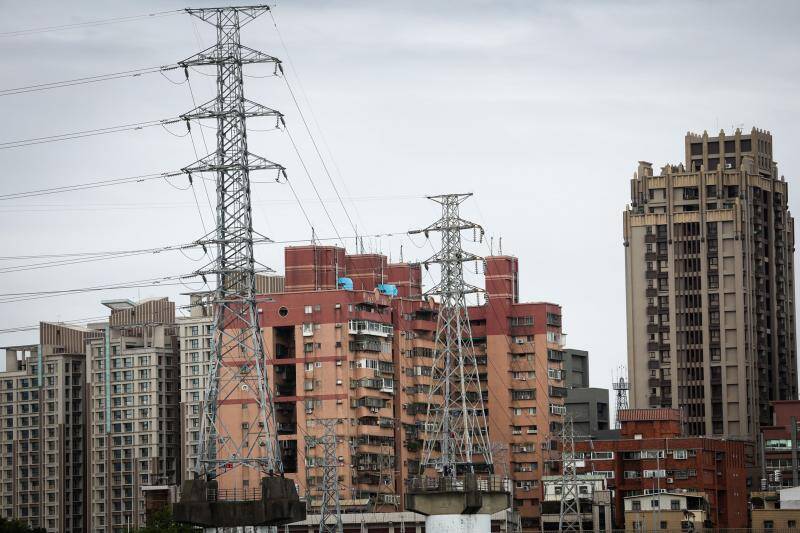A poll released on Wednesday suggested that more than 80 percent of the public would be willing to pay higher electricity bills to help reduce the risks of climate disasters.
Lin Mu-xing (林木興), a research fellow at National Taiwan University’s Risk Society and Policy Research Center, at a news conference said that the study suggested 83 percent of the public would be happy to pay a higher rate per unit of power to help protect the environment and mitigate the risk of climate emergencies.
The current rate per kilowatt-hour is NT$2.60 (US$0.08). Lin said 30 percent of people said they would be willing to pay an additional fee of less than NT$1 per kilowatt-hour, with another 30 percent saying they would pay an extra NT$1 to NT$2 and 12.5 percent of people saying they would be willing to pay an extra NT$2 to NT$3.

Photo: CNA
Only 11.6 percent of respondents said they would not be willing to pay extra, Lin added.
Lin said that the data suggested 40 percent of those willing to pay between NT$3 and NT$3.5 per kilowatt-hour were aged 21 to 30, while a majority of those willing to pay NT$2.7 to NT$2.9 per kilowatt-hour were aged 50 or older.
Chou Kuei-tien (周桂田), director of the research center, said the findings also suggested most people were aware of the importance of transitioning to renewable energy and that the government should be outlining more specific plans as to how it plans to do this.
As well as having a clear understanding of the importance of renewable power, nearly 50 percent of the respondents thought it was important to have diversified energy sources to ensure resilience, Chou said.
Chou added that 52 percent of the respondents thought renewable energy should be developed more quickly, while only 6.9 percent believed the nation needs nuclear energy.
The government needs to increase the cost of electricity to be able to create a more resilient power grid, Chou said.
The survey was conducted by telephone from May 29 to June 25 on 1,075 people aged 18 or older.

WANG RELEASED: A police investigation showed that an organized crime group allegedly taught their clients how to pretend to be sick during medical exams Actor Darren Wang (王大陸) and 11 others were released on bail yesterday, after being questioned for allegedly dodging compulsory military service or forging documents to help others avoid serving. Wang, 33, was catapulted into stardom for his role in the coming-of-age film Our Times (我的少女時代). Lately, he has been focusing on developing his entertainment career in China. The New Taipei District Prosecutors’ Office last month began investigating an organized crime group that is allegedly helping men dodge compulsory military service using falsified documents. Police in New Taipei City Yonghe Precinct at the end of last month arrested the main suspect,

A cat named Mikan (蜜柑) has brought in revenue of more than NT$10 million (US$305,390) for the Kaohsiung MRT last year. Mikan, born on April 4, 2020, was a stray cat before being adopted by personnel of Kaohsiung MRT’s Ciaotou Sugar Refinery Station. Mikan was named after a Japanese term for mandarin orange due to his color and because he looks like an orange when curled up. He was named “station master” of Ciaotou Sugar Refinery Station in September 2020, and has since become famous. With Kaohsiung MRT’s branding, along with the release of a set of cultural and creative products, station master Mikan

RISING TOURISM: A survey showed that tourist visits increased by 35 percent last year, while newly created attractions contributed almost half of the growth Changhua County’s Lukang Old Street (鹿港老街) and its surrounding historical area clinched first place among Taiwan’s most successful tourist attractions last year, while no location in eastern Taiwan achieved a spot in the top 20 list, the Tourism Administration said. The listing was created by the Tourism Administration’s Forward-looking Tourism Policy Research office. Last year, the Lukang Old Street and its surrounding area had 17.3 million visitors, more than the 16 million visitors for the Wenhua Road Night Market (文化路夜市) in Chiayi City and 14.5 million visitors at Tainan’s Anping (安平) historical area, it said. The Taipei 101 skyscraper and its environs —

LITTORAL REGIMENTS: The US Marine Corps is transitioning to an ‘island hopping’ strategy to counterattack Beijing’s area denial strategy The US Marine Corps (USMC) has introduced new anti-drone systems to bolster air defense in the Pacific island chain amid growing Chinese military influence in the region, The Telegraph reported on Sunday. The new Marine Air Defense Integrated System (MADIS) Mk 1 is being developed to counter “the growing menace of unmanned aerial systems,” it cited the Marine Corps as saying. China has constructed a powerful defense mechanism in the Pacific Ocean west of the first island chain by deploying weapons such as rockets, submarines and anti-ship missiles — which is part of its anti-access/area denial (A2/AD) strategy against adversaries — the